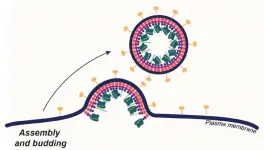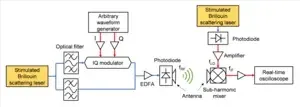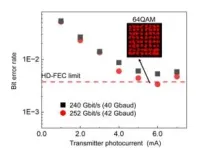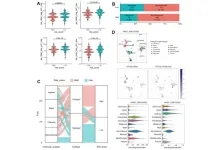(Press-News.org) Most approved gene therapies today, including those involving CRISPR-Cas9, work their magic on cells removed from the body, after which the edited cells are returned to the patient.
This technique is ideal for targeting blood cells and is currently the method employed in newly approved CRISPR gene therapies for blood diseases like sickle cell anemia, in which edited blood cells are reinfused in patients after their bone marrow has been destroyed by chemotherapy.
A new, precision-targeted delivery method for CRISPR-Cas9, published Jan. 11 in the journal Nature Biotechnology, enables gene editing on very specific subsets of cells while still in the body — a step toward a programmable delivery method that would eliminate the need to obliterate patients' bone marrow and immune system before giving them edited blood cells.
The delivery method, developed in the University of California, Berkeley, laboratory of Jennifer Doudna, co-inventor of CRISPR-Cas9 genome editing, involves wrapping the Cas9 editing proteins and guide RNAs in a membrane bubble that has been decorated with pieces of monoclonal antibodies that home in on specific types of blood cells.
As a demonstration, Jennifer Hamilton, a CRISPR researcher in the Doudna laboratory at the Innovative Genomics Institute (IGI), targeted a cell of the immune system — a T-cell — which is the starting point for a revolutionary cancer treatment called chimeric antigen receptor (CAR) T-cell therapy. Hamilton and her colleagues treated live mice that had been equipped with a humanized immune system and turned their human T-cells into CAR T-cells able to home in on and eliminate another class of immune cell, a B cell.
The feat was a proof of principle, Hamilton said, showing the potential to use this carrier method — enveloped delivery vehicles — to target and edit blood cells and potentially other types of cells in living animals (in vivo) and, eventually, humans.
"Our approach involves multiplexing targeting molecules, that is, having two or more targeting molecules on our particles that interact with their target cell somewhat like an AND gate in a computer," said Hamilton, referring to logic circuits that operate only when two events happen simultaneously. "We were able to get more effective delivery when the particles bound using two antibody ligand interactions. After treating mice with T-cell-targeted vectors, we observed genome engineering in our cell type of interest, T-cells, and not in liver hepatocytes.”
Highly specific targeting is difficult for all methods of delivering genes into cells, she said. Liver cells, in particular, often take up delivery vehicles directed elsewhere.
Viral envelopes
Hamilton and her team are investigating one of several experimental techniques for delivering gene therapies. Many employ the outer coat of encapsulated viruses — the viruses are emptied out and stuffed with corrective transgenes or gene editing tools such as CRISPR-Cas9. Other methods, including one being explored by researchers at IGI, rely on directly injecting cell-penetrating Cas9 proteins into mice to achieve genome editing.
Hamilton, who studied enveloped viruses such as influenza for her Ph.D., focused on engineering that class of viruses because they have a more flexible outer coat, which consists of the exterior membrane of the cell from which they budded.
In a 2021 publication, she demonstrated that the exterior envelope of an HIV-1 virus, which had been gutted and filled with Cas9 and she called a virus-like particle (VLP), could edit T-cells in culture (ex vivo) and convert them to CAR T-cells. Since then, she has altered the viral envelope so much that she now refers to them as enveloped delivery vehicles, or EDVs.
One key aspect of EDVs is that their outer envelopes can be easily decorated with more than one antibody fragment or targeting ligand, which greatly improves the targeting specificity. Other gene delivery vehicles, such as adeno-associated viruses and lipid nanoparticles, have proven harder to target precisely.
"There are efforts to retarget all of these vectors to have specificity towards one cell type and de-target them against delivery to other cell types," Hamilton said. "You can display antibodies or antibody fragments, like what we've been doing, but the uptake in bystander cells is still quite high. You can bias the delivery into one cell type, but you may still observe uptake in bystander cells. In our paper, we actually looked in the liver to see if we were getting off-target delivery and saw none. I think it would be more challenging to achieve that with a more traditional non-enveloped viral vector or lipid nanoparticle."
In the paper, Hamilton and her colleagues sought to replicate in vivo an ex vivo CRISPR CAR T-cell therapy successfully given to cancer patients that was reported in Science in 2020. That therapy not only delivered a transgene for a receptor targeting cancer cells, but knocked out, using CRISPR, receptors not targeting the cancer.
The UC Berkeley researchers succeeded in knocking out the native T-cell receptor and delivering a transgene for a receptor that targeted B cells — a proxy for cancer cells. Because the Cas9 protein was delivered along with the transgene within the same EDV, it had a shorter life span than methods that deliver a Cas9 gene, which translates to fewer off-target edits.
"What we've tried to achieve in this paper," Hamilton said, "is skipping that whole step of having to engineer cells outside the body. We aimed to systemically administer a single vector that would do both gene delivery and gene knockout in specific cell types inside the body. We used this delivery strategy to make gene-edited CAR T-cells in vivo, in the hopes that we’d be able to streamline the complex process used to manufacture gene-edited CAR T-cells ex vivo."
Doudna and her lab continue to improve the efficiency of EDV-mediated delivery. Hamilton, formerly a postdoctoral researcher in Doudna’s lab, is further developing this delivery method as a fellow in the IGI's Women in Enterprising Science program. The lab's ultimate reason for focusing on vectors that work in vivo is to make CRISPR therapies more broadly available and cheaper. In a recent essay in Wired magazine, Doudna referred to the inequities of today's expensive gene therapies, in part due to extended hospital stays that are required when a patient undergoes a bone marrow transplant.
"The therapy for sickle cell disease is projected to cost over $2 million per patient, and only a small number of facilities in the U.S. have the technological capability to provide it," wrote Doudna, who shared the 2020 Nobel Prize in Chemistry for her co-invention of CRISPR-Cas9 genome editing. "New technologies allowing in vivo delivery of gene-editing therapies and improved manufacturing will be key to driving prices down, as will unique partnerships between universities, government and industry, brought together with affordability as a common goal. It is not enough to simply make the tools. We must ensure they reach those who need them most."
In addition to Hamilton and Doudna, other co-authors of the paper are Evelyn Chen, Barbara Perez, Cindy Sandoval Espinoza, Min Hyung Kang and Marena Trinidad, all affiliated with the IGI and UC Berkeley's Department of Molecular and Cell Biology, and Wayne Ngo of the Gladstone Institutes in San Francisco.
Funding was provided by the National Institutes of Health (RM1HG009490, U01AI142817-02, U19 64542, 64340), U.S. Department of Energy (63645), Emerson Collective and Howard Hughes Medical Institute. Hamilton was supported by the National Institute of General Medical Sciences (K99GM143461-01A1) and the Jane Coffin Childs Memorial Fund for Medical Research.
END
Highly targeted CRISPR delivery system advances gene editing in living animals
Antibody-targeted 'enveloped delivery vehicles' selectively edit T-cells to create CAR T-cells
2024-02-01
ELSE PRESS RELEASES FROM THIS DATE:
The Lancet Public Health: Transgender, non-binary, and gender diverse people more likely to have a long-term mental health condition, first England-wide study suggests
2024-02-01
Study of 1.5 million people over the age of 16 in England, including nearly 8,000 transgender people, finds a higher proportion of transgender adults report having a long-term mental health condition than cisgender adults.
Additionally, those with a gender identity other than cisgender male or cisgender female were more likely to report their mental health needs were unmet at their last general practice appointment.
Authors call for the NHS to become more gender-inclusive, including by introducing better training for health-care professionals to improve their ability ...
UT extension specialist selected to coordinate national network
2024-02-01
A University of Tennessee Extension specialist has been selected to help lead a new national effort to connect resources and individuals in the quickly evolving food and agriculture career sector.
Clint Cummings, Extension specialist in the Department of Family and Consumer Sciences, will serve as the National Network Lead and Regional Network Coordinator for the Southern Region for the new AgriProspects Workforce Development Network project. This project is being conducted through the Extension Foundation in collaboration with the ECOP (Extension Committee on Organization and Policy) Economic & Workforce Development Program Action Team and NECIW (National Extension ...
Pacific nations tax unhealthy foods to tackle NCD crisis
2024-02-01
Pacific Island governments are increasingly imposing taxes on unhealthy foods as they battle a non-communicable disease crisis, a New Zealand study shows.
The research, led by the University of Otago, Wellington, found that since 2000, a quarter of the 22 Pacific Island countries and territories studied had introduced taxes targeting unhealthy foods, a strategy in line with recommendations from the World Health Organization.
The study of food taxation policies over the 20 years to 2020 is published in the international journal Public Health Nutrition.
Senior Research Fellow, ...
Climate change threatens older elephants most, jeopardizing African elephants’ future
2024-01-31
January 31, 2024
Climate Change Threatens Older Elephants Most, Jeopardizing African Elephants’ Future
New study from UMass Amherst and Wildlife Conservation Society finds that continuing international cooperation, community involvement most important in ensuring elephants’ survival
AMHERST, Mass. – A collaborative team of researchers from the University of Massachusetts Amherst and the Wildlife Conservation Society (WCS), which runs the world’s largest field conservation program, has conducted first-of-its kind research into how global climate change affects African elephants. The work, published recently in PLOS Sustainability and Transformation, ...
Prognostic significance of senescence-related tumor microenvironment genes in head and neck squamous cell carcinoma
2024-01-31
“These findings provided evidence for the role of senescence in the tumor microenvironment [...]”
BUFFALO, NY- January 31, 2024 – A new research paper was published on the cover of Aging (listed by MEDLINE/PubMed as "Aging (Albany NY)" and "Aging-US" by Web of Science) Volume 16, Issue 2, entitled, “Prognostic significance of senescence-related tumor microenvironment genes in head and neck squamous cell carcinoma.”
The impact of the senescence related microenvironment on cancer prognosis and therapeutic response remains poorly understood. In this new study, researchers Young Chan Lee, Yonghyun Nam, Minjeong Kim, ...
UTIA trade expert elected president of SAEA
2024-01-31
Andrew Muhammad, professor and Blasingame Chair of Excellence in Agricultural Policy at the University of Tennessee Institute of Agriculture, has been elected president of the Southern Agricultural Economics Association. The newly elected president will be recognized at the Association’s upcoming annual meeting in Atlanta, Georgia, from February 3-6.
“We are excited for Dr. Muhammad in this important leadership role,” says Bill Johnson, interim department head for UT’s Department of Agricultural and Resource Economics. “His previous experience with SAEA and his global perspective on agriculture ...
Diabetes medication class tied to lower risk of kidney stones
2024-01-31
Rates of kidney stones are on the rise in the United States and around the world. Type 2 diabetes is associated with increased risk of kidney stones, but some forms of treatment for this condition may also have the benefit of lowering risk of kidney stones. In a study led by investigators from Mass General Brigham, researchers found that there was an association between the use of sodium-glucose contratransporter 2 (SGLT2) inhibitors and a lower risk of developing kidney stones. Their findings are reported in JAMA Internal Medicine.
Researchers from Brigham and Women’s Hospital and Massachusetts ...
Engineers develop hack to make automotive radar hallucinate
2024-01-31
DURHAM, N.C. – A black sedan cruises silently down a quiet suburban road, driver humming Christmas carols quietly while the car’s autopilot handles the driving. Suddenly, red flashing lights and audible warnings blare to life, snapping the driver from their peaceful reprieve. They look at the dashboard screen and see the outline of a car speeding toward them for a head-on collision, yet the headlights reveal nothing ahead through the windshield.
Despite the incongruity, the car’s autopilot grabs control and swerves into a ditch. Exasperated, the driver looks around the vicinity, ...
Strong European backing for Ukraine leaves “little space” for exploitation of pro-Russian politics, study shows
2024-01-31
Strong support for Ukraine means there is “little space” for European politicians to exploit pro-Russia foreign policy messages, a new study shows.
Researchers have found widespread backing for Ukraine across the continent, and for policies that help the nation, such as imposing sanctions on Russia.
But public opinion is more mixed on the approach NATO should take and whether Ukraine should become a member.
Experts found European nations can be classified into three distinct groups. Citizens ...
Did dementia exist in ancient Greek and Rome?
2024-01-31
You might think age-related dementia has been with us all along, stretching back to the ancient world.
But a new analysis of classical Greek and Roman medical texts suggests that severe memory loss — occurring at epidemic levels today — was extremely rare 2,000 to 2,500 years ago, in the time of Aristotle, Galen and Pliny the Elder.
The USC-led research, published in the Journal of Alzheimer’s Disease, bolsters the idea that Alzheimer’s disease and related dementias are diseases of modern environments and lifestyles, with sedentary behavior and exposure to air pollution largely to blame.
“The ancient Greeks had very, very few — but we found them ...
LAST 30 PRESS RELEASES:
GLP-1 drugs associated with reduced need for emergency care for migraine
New knowledge on heritability paves the way for better treatment of people with chronic inflammatory bowel disease
Under the Lens: Microbiologists Nicola Holden and Gil Domingue weigh in on the raw milk debate
Science reveals why you can’t resist a snack – even when you’re full
Kidney cancer study finds belzutifan plus pembrolizumab post-surgery helps patients at high risk for relapse stay cancer-free longer
Alkali cation effects in electrochemical carbon dioxide reduction
Test platforms for charging wireless cars now fit on a bench
$3 million NIH grant funds national study of Medicare Advantage’s benefit expansion into social supports
Amplified Sciences achieves CAP accreditation for cutting-edge diagnostic lab
Fred Hutch announces 12 recipients of the annual Harold M. Weintraub Graduate Student Award
Native forest litter helps rebuild soil life in post-mining landscapes
Mountain soils in arid regions may emit more greenhouse gas as climate shifts, new study finds
Pairing biochar with other soil amendments could unlock stronger gains in soil health
Why do we get a skip in our step when we’re happy? Thank dopamine
UC Irvine scientists uncover cellular mechanism behind muscle repair
Platform to map living brain noninvasively takes next big step
Stress-testing the Cascadia Subduction Zone reveals variability that could impact how earthquakes spread
We may be underestimating the true carbon cost of northern wildfires
Blood test predicts which bladder cancer patients may safely skip surgery
Kennesaw State's Vijay Anand honored as National Academy of Inventors Senior Member
Recovery from whaling reveals the role of age in Humpback reproduction
Can the canny tick help prevent disease like MS and cancer?
Newcomer children show lower rates of emergency department use for non‑urgent conditions, study finds
Cognitive and neuropsychiatric function in former American football players
From trash to climate tech: rubber gloves find new life as carbon capturers materials
A step towards needed treatments for hantaviruses in new molecular map
Boys are more motivated, while girls are more compassionate?
Study identifies opposing roles for IL6 and IL6R in long-term mortality
AI accurately spots medical disorder from privacy-conscious hand images
Transient Pauli blocking for broadband ultrafast optical switching
[Press-News.org] Highly targeted CRISPR delivery system advances gene editing in living animalsAntibody-targeted 'enveloped delivery vehicles' selectively edit T-cells to create CAR T-cells








